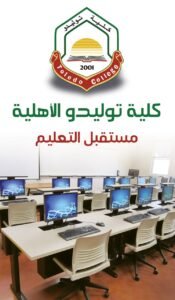Qualifi Level 5 Extended Diploma in Information Technology
All units are mandatory and learners need to achieve all the mandatory units to be awarded the Qualifi Level 5 Extended Diploma in Information Technology. Learners who achieve 120 credits at Level 4 may be awarded an exit qualification. This will be the QUALIFI Level 4 Diploma in Information Technology.
The Level 5 units are designed to dovetail into a top-up undergraduate year at a UK University.
Completing the QUALIFI Level 5 Diploma in all IT related qualifications will enable learners to progress to:
- QUALIFI Level 6 Diploma in related area.
- Final year of a HE qualification/degree in related area (subject to acceptance by the awarding institution).
- Employment in an associated profession.
Course Title
Qualifi Level 5 Extended Diploma in Information Technology
Course Level
Course Credits
Study Method
Start Date
Course Duration
Awarded By
Toledo College – Irbid – Jordan
Course Description
The rationale for the qualification is that it provides a career path for learners who wish to develop a broad base of knowledge and skills that will enable them to work in a variety of roles in the IT industry, notably in .NET programming, system administration and network security. Learners will also learn about entrepreneurship in a techno environment. The qualification is flexible in that it offers elective choices of networking, web design or e-commerce – the latter being much in demand in modern business.
The technical skills and knowledge delivered through the successful achievement of the qualification are required and recognised internationally.

Course Content
Information Technology and IT Ethics
This unit aims to develop learners’ knowledge and use of information technology including the use of standard office applications to prepare documents and presentations. This includes computer software and hardware, basic computer operations, application software, operating systems, information systems and IT-related issues in computing.
The unit also seeks to provide learners with an awareness of ethical issues essential to an IT professional. This includes ethics in the cyberspace, intellectual property, privacy, the issue of security and reliability, how computing affects our health, professional code of ethics and how IT changes our daily lives.
Mathematics and Statistics for IT
This unit aims to provide an opportunity to learn mathematics and statistics and equip learners with the mathematical skills to analyse and solve problems that will enable them to work within the field of IT. The unit covers number systems, logic, relations, functions, quadratic equations, quadratic functions, simultaneous equations, polynomial equations, exponential functions, logarithmic functions, coordinate geometry and matrices.
The unit provides an opportunity to learn statistics and equip learners with the descriptive and analytical methods for dealing with variability in observed data. It covers graphical presentation of data, descriptive statistics, index numbers, correlation and regression, time series, probability and statistical inference.
PC Maintenance and Operating Systems
This unit aims to provide knowledge of personal computer hardware. Successful completion of this unit will enable learners to install a computer system unit and operating system and conduct troubleshooting. The unit provides the essential knowledge of computer hardware, the software needed to make a hardware work, the components of the hardware and the technologies and principles that support the components. In addition to this knowledge, learners will be able to assemble computer hardware to build a full set PC, understand how to install the operation system and how to conduct troubleshooting in faulty hardware.
This unit also aims to provide the basic concepts about operating systems and to be able to install, configure and operate two commonly used operating systems. It includes an overview of Windows and Linux operating systems, the installation and configuration of these systems; the use of proper file systems; managing groups and users; installing and uninstalling applications on these two operating systems; operating basic command-line environment; manipulating simple files and printer-sharing.
Computer Graphics Editing and Database Concepts
This unit aims to explain the concepts of photo editing. This will enable learners to insert photos into documents such as user manuals and the IT structure of an organization. The photos may need to be touched up before they are ready for use. This mainly involves using Adobe Photoshop and Adobe Illustrator for photo/image editing and designing.
The unit delivers skills in photo retouching and digital drawing to address the issues of digital image design. It emphasizes exploration, techniques, media, ideas development and production techniques. This unit also provides the fundamental concepts of a database system through Database Management System (DBMS), relational databases, entity relationship modelling and normalization. Learners are also required to create database systems using the database language of Structured Query Language (SQL).
Web Design 1
This unit aims to provide learners with skills in website design and development. This includes techniques for writing web pages with Hypertext Markup (HTML) and Cascading Style Sheets (CSS).
Programming Concepts and Java for Android Programming
This unit aims to develop programming skills. This unit includes variables, control and decision (if and switch) as well as loops and program control (for, while, do-while).
This unit also enables learners to develop software for Android telephones using Java development tools. The emphasis is on developing applications as a community that run on the Android platform. Successful completion of this unit will give learners an insight into today’s common procedures for getting their mobile application work published.
Technopreneurship
This unit aims to provide learners with the knowledge and skills needed to establish a new techno business. It includes understanding the characteristics of entrepreneurs, planning, marketing and finance.
Network Security
This unit aims to provide learners with knowledge of network security issues in a networked environment and the process of preventing and detection common security incidents. The unit covers authentication; attacks and malicious codes; the security of remote access; email and web security; the security of directory and file transfer services; storage media; network security; intrusion detection; physical and security and disaster recovery.
C#.NET Programming
This unit aims to provide learners with the basic concepts and principles of ASP.NET programming using C#. This will enable learners to understand how to create dynamic web pages using server-side programming techniques. The unit covers component-based programming and how to access records in relational databases. Successful achievement of this unit will enable learners to create their own web applications and make them available on the internet.
System Administration
This unit aims to provide the knowledge needed to administer a system in Linux and Windows. Topics covered include user and group management; file system management; task automation; shell scripting; Dynamic Host Configuration Protocol (DHCP) servers; mail servers; domain name servers; files and printers sharing; basic utilities and tools; application management; registry; local and group policies; backup policies; restore policies and performance tuning.
Content Management Systems
This unit aims to provide learners with the knowledge and skills needed to use content management systems (CMS) as a tool for the creation of digital content. Successful achievement of this unit will enable learners to understand CMS roles, content modelling, content aggregation, publication management and content migration.
Business to Business (B2B) Ecommerce
This unit aims to provide learners with knowledge of Business to business (B2B) ecommerce. This includes Electronic Data Interchange (EDI), Electronic Funds Transfer (EFT), online transaction processing, inventory management systems and supply chain management.

Achievement Requirements
Learners must demonstrate they have met all assessment criteria for all units to achieve the Qualifi Level 5 Extended Diploma in Information Technology qualifications. QUALIFI will issue certificates to all successful learners via their registered college.
Study Method
The Qualifi Level 5 Extended Diploma in Information Technology is studied through Education Global Network’s leading college (Toledo College) in-class learning. You will be provided instant access to study materials, dedicated one-on-one tutoring and assignment feedback through qualified tutors.
Our online learning platform is designed to provide students with a flexible and convenient way to access high-quality education. With a vast library of study materials and resources available 24/7, students can learn at their own pace and on their own schedule.
Our experienced and knowledgeable tutors are available to answer questions, provide feedback, and offer guidance to help students succeed.
Course Fees
Please get in touch with us to get the most up-to-date course fee for Qualifi Level 5 Extended Diploma in Information Technology. Monthly Installment is available.
Entry Requirements
The qualification has been designed to be accessible without artificial barriers that restrict access, for this qualification applicants must be aged 18 or over. It is envisaged that learners entering the Level 4 Diploma will have a Level 3 qualification. Learners entering the Level 5 Diploma will have a Level 4 qualification. Please make an enquiry Now.

Apply now to embark on your academic journey and unlock endless opportunities! Join our vibrant community of scholars and leaders, and pursue your passion with an internationally recognised British qualification.
Click Apply Now to start your application for the Qualifi Level 5 Extended Diploma in Information Technology programme today.
